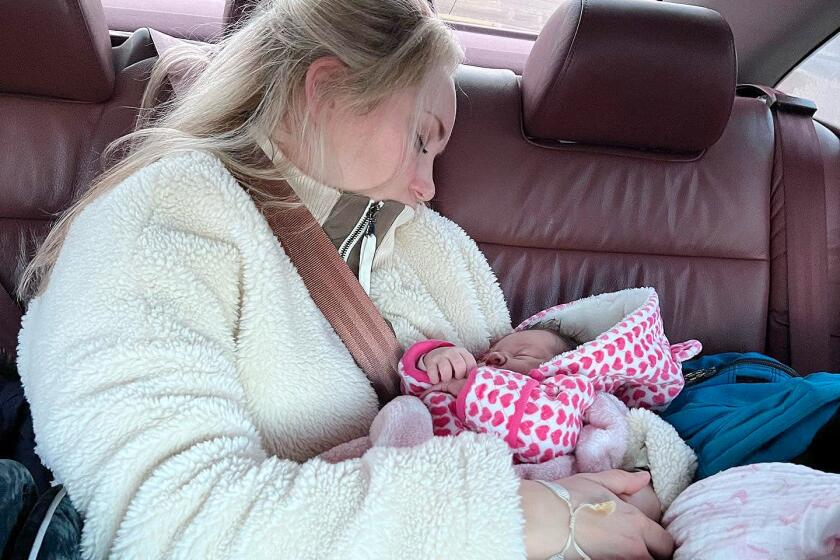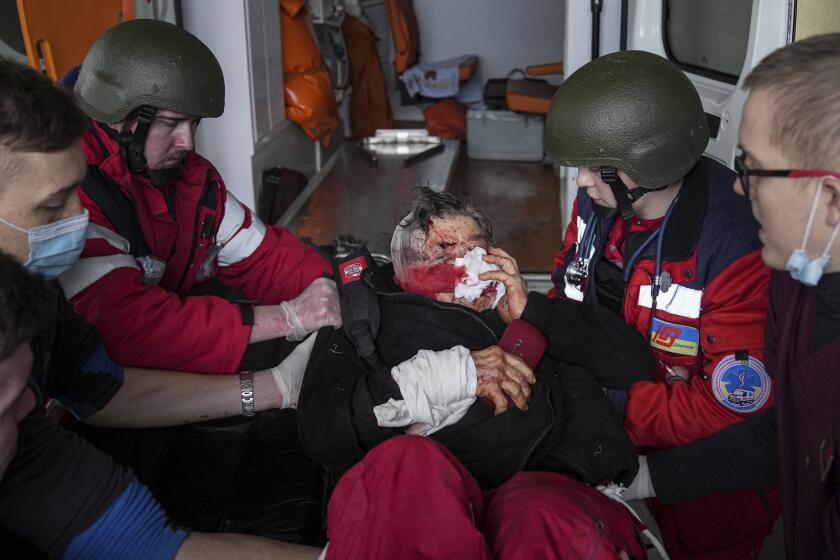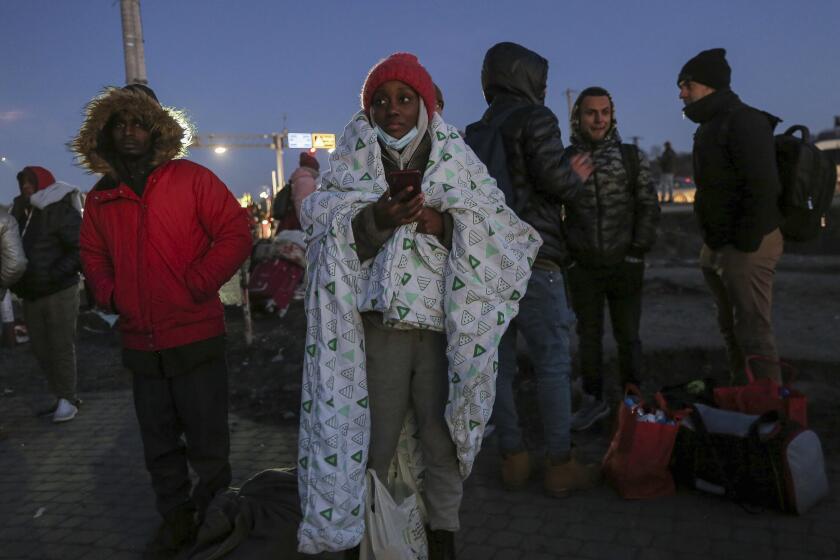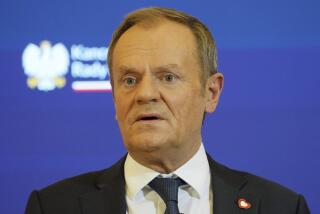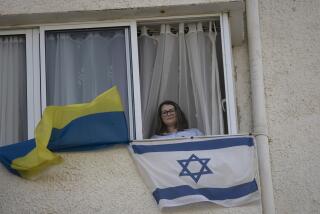City in Poland’s southeast becomes major travel hub for refugees from Ukraine
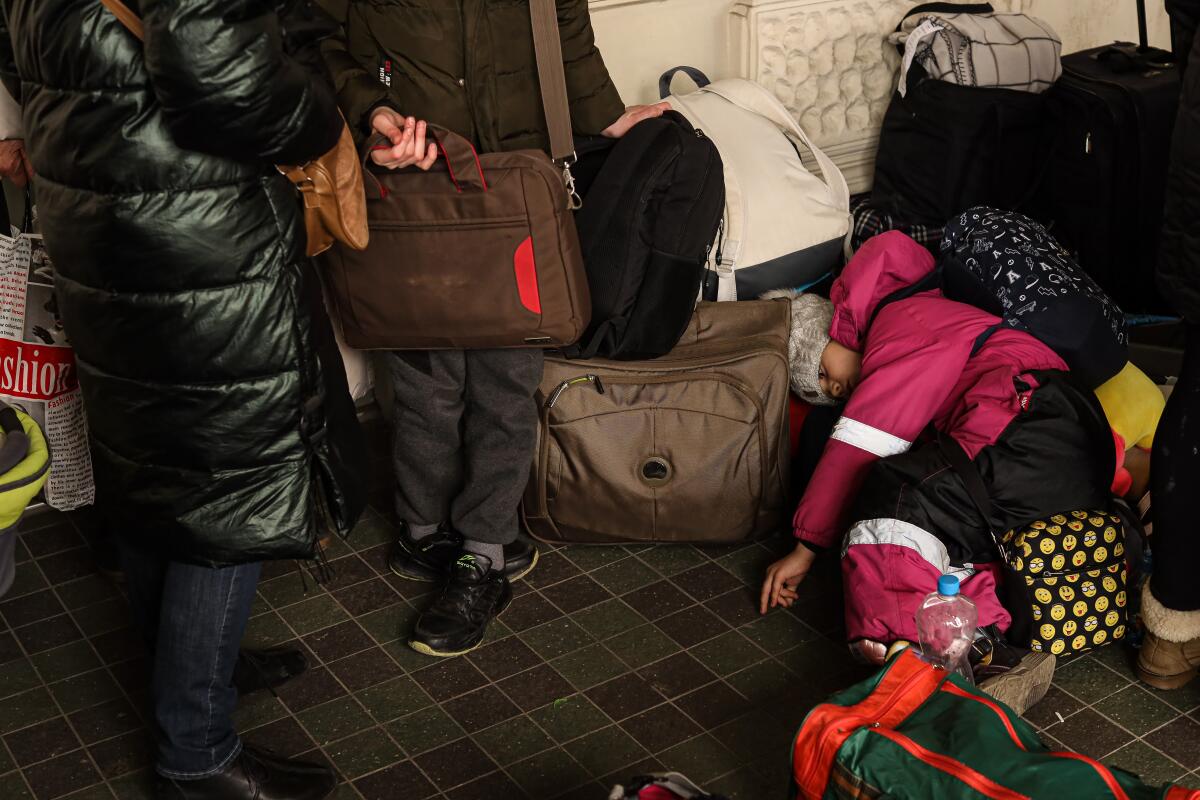
- Share via
PRZEMYSL, Poland — Oskar Broz stood in the Polish train station amid the tumult of anxious refugees, overwhelmed police officers and exhausted volunteers distributing hot food and drink.
“The Warsaw train leaves at 2 a.m.!” announced Broz, his words echoing in the sturdy walls of the Neoclassical structure. “The train is free! You need no ticket! 2 a.m. to Warsaw!”
Similar scenes repeat over and over these days at the central train station in Przemysl, a normally tranquil city in southeastern Poland that has become the major gateway for Ukrainian refugees fanning out across Europe.
As of Wednesday, more than a million people had fled Ukraine since Russia attacked last week, according to the United Nations, and the number was expected to keep climbing. About half headed to Poland, the U.N. said, while many others sought shelter in Ukraine’s other western neighbors — Hungary, Moldova, Romania, Slovakia and other countries — and some moved to the Russian Federation.
Przemysl emerged as a principal focus of the ongoing exodus because it is the first major city to the west of Medyka, the busiest crossing point along the 300-mile Polish-Ukrainian border.
The city is part of Eastern Europe’s historic Galicia region, for centuries a battleground for invaders and empires from east and west. During World War II, Nazi forces occupied Przemysl and carried out mass killings in the city’s once-thriving Jewish community.
Residents today describe Przemysl as a quiet, family-friendly place with a population of about 60,000 people. The war in Ukraine, how-ever, has transformed Przemysl once again in only a few days.
Each day, buses from the border deposit hundreds of people in the city, which now resembles a sprawling refugee metropolis.
Mainly, they are women and children. The Ukrainian government has banned the exit of men ages 18-60, urging them instead to join in the defense against Russia.
Many refugees initially arrive at the sprawling parking lot of a shopping center along a main drag. The site — run mostly by Polish volunteers and nongovernmental aid groups — offers tents to spend the night and free food, diapers, medical care and other goods and services, including SIM cards for cellphones. The effort is part of a huge and rapidly organized welcome for the refugees.
“Our hearts go out to our brothers and sisters from Ukraine,” said Grazyna Skotnicka, 62, who, along with other women from nearby rural towns, had prepared almost 80 gallons of chicken soup to hand out under the aegis of Caritas, the Roman Catholic aid group. “This is who we Polish people are. Our hearts are caring.”
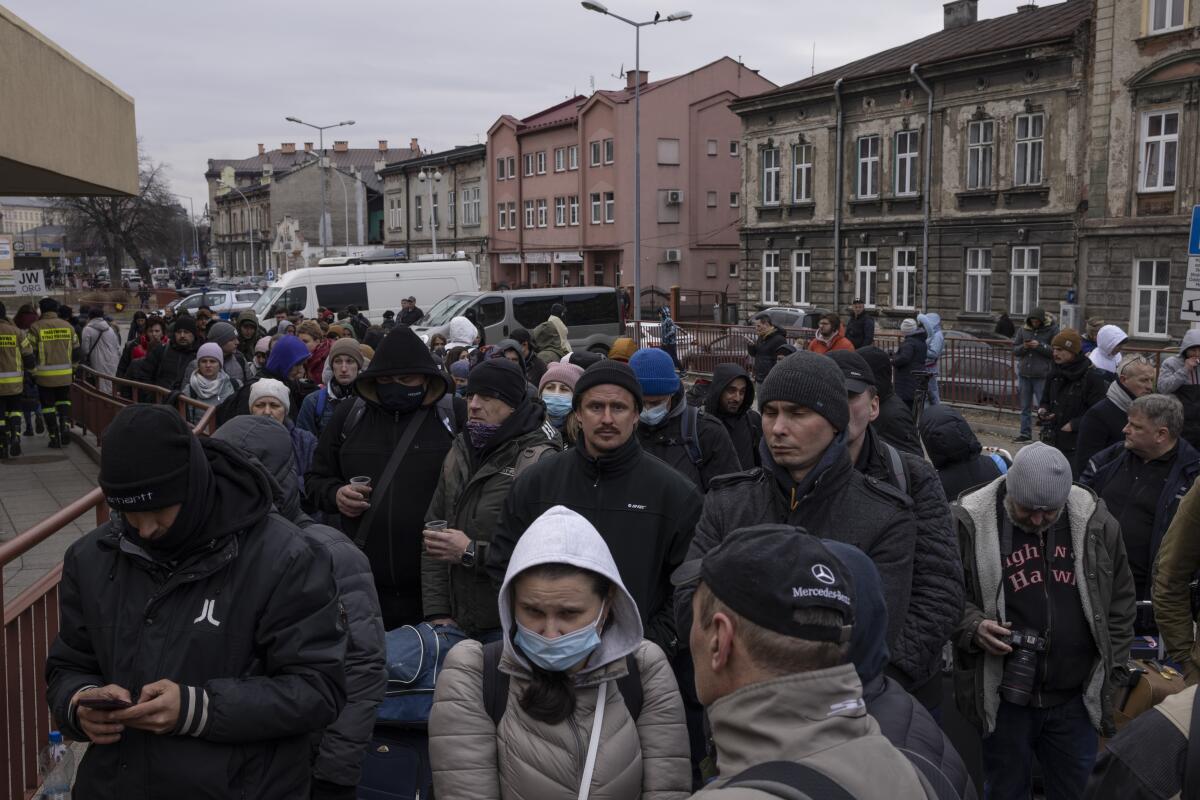
The fact that President Vladimir Putin of Russia — Poland’s historical adversary — initiated the invasion into Ukraine has played into the warm reception afforded to those fleeing Ukraine.
“Putin started this war, and these poor people are paying the price,” said Piotr Bukowski, 67, a retired policeman who was helping to direct traffic in the parking lot as part of the volunteer effort. “Seeing their plight brings me to tears.”
Volunteers and officials have worked out an elaborate system to ensure that the refugees connect with relatives, friends or with families willing to put them up. Online chat groups convey offers of free lodging.
Volunteers offering rides await those arriving from the borders. As the buses pull up, drivers hoist cardboard signs with handwritten destinations, mostly in Poland but also elsewhere in Europe. The other day, volunteer drivers held up signs offering free lifts as far as Germany and the Netherlands. Bus drivers match the refugees’ destinations with the drivers.
Jessie and Jacob Boeckmann, of Costa Mesa, escaped from Ukraine with their newborn in an effort to flee from the Russian invasion.
Women, many with small children, gather around their luggage brought from Ukraine. The speed of events overwhelms some people.
“I still can’t believe this is happening today, in Europe, in the 21st century,” said Katarina, 23, who, like many refugees interviewed, declined to give her last name, fearful for relatives still in Ukraine, including five brothers. “One day it seemed everything was normal, then we were running out.”
She and her sister, Yana, 25 — and Yana’s 2-year-old son, Andrusha — have found a place through social media with a family outside Krakow, nearly 130 miles to the west.
Katarina, like others, expressed hope that this would be a short war. “I am Ukrainian; I plan to return soon.” She said she expected her refugee status to last just two weeks.
Not quite so optimistic were Victoria Hepurna and her sister, Ena, who were on a crowded platform at the main train station, a few blocks from the parking lot. Each was accompanied by two children.
The women described a harrowing escape from their hometown, Zaporizhzhia, in southeastern Ukraine.
After the invasion began, they said, they drove five hours at night to the Ukrainian city of Mariupol, occasionally switching off headlights in a bid to not attract attention. A three-day train odyssey brought them to Przemsyl.
A fire in a Ukrainian nuclear reactor has been extinguished, radiation levels remain normal and the plant is in the hands of Russian forces, authorities say.
They were now planning to board a train to Berlin, a place they had never been.
“Someone said they would put us up, so we are on our way,” Victoria Hepurna said. “We are really not sure what it will be like, or how long it will take.”
The 19th century station, featuring marble columns and paintings of pastoral scenes, was abuzz with activity. People hastened to platforms. Some slept on the floor. Others grabbed free hot drinks and sandwiches. A Red Cross station provided aid to the sick.
Among those at the station were significant numbers of foreign students — some from India, Pakistan and Nigeria — who had also fled Ukraine, where tens of thousands of foreigners study medicine, business and other subjects, attracted in part by moderate fees and living costs.
Some who fled to Poland complained of what they viewed as racist behavior by Ukrainian authorities, who, they said, made non-Ukrainians wait for hours at the border before allowing them to leave and prevented them from boarding buses, forcing them to walk in the cold across the international boundary to Poland.
“The Ukrainians treated us terribly,” said Ayodeji Edet, 27, a Nigerian who was among those waiting in the station, though he wasn’t sure where he was headed.
Some non-Ukrainian refugees have complained that they have waited longer in line to cross the Polish border than Ukrainians, and in some cases were treated poorly.
Students interviewed said they had generally received better treatment once they crossed into Poland, though many had to wait for hours in the cold at the Polish border town of Medyka before being provided transport to Przemysl.
The Polish Embassy in Abuja, the Nigerian capital, issued a statement saying it was “greatly saddened by allegations appearing on social media that some Nigerian nationals are denied entry to Poland from Ukraine.”
Poland said it has waived visa requirements for Nigerians and others entering from Ukraine.
“What will I do next? I’m not sure. Maybe go back to Nigeria,” Edet said. “Really, what I am looking for now is some greener pasture.”
Behind him, Broz — a Polish law professor who volunteered to help at the station — continued to announce departing trains. He encouraged everyone to get on board to reach locales elsewhere in Poland and Europe.
“Przemysl is a small city, it really cannot handle so many refugees like this,” said Broz, wearing an orange vest, like other volunteers. “Yes, Przemysl is prepared to help people, but even that has limits. Hopefully, they will all find a place to be safe. We can only do so much here.”
Special correspondents Liliana Nieto del Río and Wiktor Bruchal contributed to this report.
More to Read
Sign up for Essential California
The most important California stories and recommendations in your inbox every morning.
You may occasionally receive promotional content from the Los Angeles Times.
